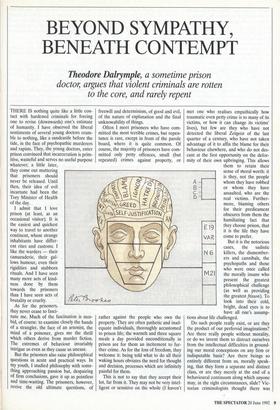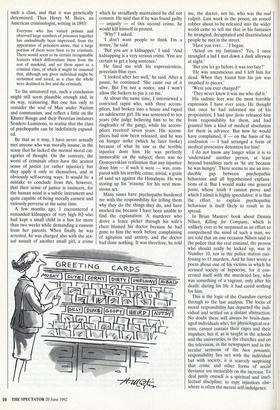BEYOND SYMPATHY, BENEATH CONTEMPT
Theodore Dalrymple, a sometime prison
doctor, argues that violent criminals are rotten to the core, and rarely repent
THERE IS nothing quite like a little con- tact with hardened criminals for forcing one to revise (downwards) one's estimate of humanity. I have observed the liberal sentiments of several young doctors crum- ble to nothing, like a sandcastle before the tide, in the face of psychopathic murderers and rapists. They, the young doctors, enter prison convinced that incarceration is prim- itive, wasteful and serves no useful purpose whatever; a little later, they come out muttering that prisoners should never be released. Until then, their idea of evil incarnate had been the Tory Minister of Health of the day.
I admit that I love prison (at least, as an occasional visitor). It is the easiest and quickest way to travel to another continent, whose strange inhabitants have differ- ent rites and customs. I like the warders — their camaraderie, their gal- lows humour, even their rigidities and stubborn rituals. And I have seen many more acts of kind- ness done by them towards the prisoners than I have seen acts of brutality or cruelty.
As for the prisoners, they never cease to fasci- nate me. Much of the fascination is mor- bid, of course: to examine closely the hands of a strangler, the face of an arsonist, the mind of a poisoner, gives me the thrill which others derive from murder fiction. The extremes of behaviour invariably Intrigue us even as they cause us unease.
But the prisoners also raise philosophical questions in acute and practical ways. In my youth, I studied philosophy with some- thing approaching passion but, despairing of firm conclusions, gave it up as pointless and time-wasting. The prisoners, however, revive the old ultimate questions, of freewill and determinism, of good and evil, of the nature of explanation and the final unknowability of things.
Often I meet prisoners who have com- mitted the most terrible crimes, but repen- tance is rare, except in front of the parole board, where it is quite common. Of course, the majority of prisoners have com- mitted only petty offences, small (but repeated) crimes against property, or rather against the people who own the property. They are often pathetic and inad- equate individuals, thoroughly accustomed to prison life; the warmth and three square meals a day provided unconditionally in prison are for them an incitement to fur- ther crime. As for the loss of freedom, they welcome it: being told what to do all their waking hours obviates the need for thought and decision, processes which are infinitely painful for them.
This is not to say that they accept their lot, far from it. They may not be very intel- ligent or sensitive on the whole (I haven't met one who realises empathically how traumatic even petty crime is to many of its victims, or how it can change its victims' lives), but few are they who have not detected the liberal Zeitgeist of the last quarter of a century, who have not taken advantage of it to affix the blame for their behaviour elsewhere, and who do not des- cant at the first opportunity on the defor- mity of their own upbringing. This allows them to retain their sense of moral worth: it is they, not the people whom they have robbed or whom they have assaulted, who are the real victims. Further- more, blaming others for their predicament obscures from them the humiliating fact that they choose prison, that it is the life they have come to prefer.
But it is the notorious cases, the sadistic N 6 killers, the dismember- ers and cannibals, the psychopaths and those who were once called M 21 the morally insane who present the greatest philosophical challenge (as well as providing the greatest frisson). To look into their cold, bright, dead eyes is to have all one's assump- tions about life challenged.
Do such people really exist, or are they the product of our perfervid imaginations? Are there really people without morality, or do we invent them to distract ourselves from the intellectual difficulties in ground- ing our moral conceptions on any firm or indisputable basis? Are there beings so entirely different from us, morally speak- ing, that they form a separate and distinct class, or are they merely at the end of a behavioural continuum along which anyone may, in the right circumstances, slide? Vic- torian criminologists thought there was such a class, and that it was genetically determined. Thus Henry M. Boles, an American criminologist, writing in 1893:
Everyone who has visited prisons and observed large numbers of prisoners together has undoubtedly been impressed, from the appearance of prisoners alone, that a large portion of them were born to be criminals. There would seem to be certain recognisable features which differentiate these from the rest of mankind, and set them apart as a criminal class, of which it might be assumed that, although any given individual might be reclaimed and saved, as a class the whole were destined to live and die criminals.
To the untutored eye, such a conclusion might still seem plausible enough and, in its way, reassuring. But one has only to consider the soul of Man under Nazism and communism, and reflect a little on the Khmer Rouge and their Peruvian imitators Sendero Luminoso, to realise that the class of psychopaths can be indefinitely expand- ed.
Be that as it may, I have never actually met anyone who was morally insane, in the sense that he lacked the normal moral cat- egories of thought. On the contrary, the worst of criminals often have the acutest sense of justice (or rather injustice): but they apply it only to themselves, and in obviously self-serving ways. It would be a mistake to conclude from this, however, that their sense of justice is insincere, for the human mind is a subtle instrument and quite capable of being morally earnest and viciously perverse at the same time.
A few months ago, I encountered a remanded kidnapper of very high 10 who had kept a small child in a box for more than two weeks while demanding a ransom from her parents. When finally he was arrested, he was charged also with the sex- ual assault of another small girl, a crime
which he steadfastly maintained he did not commit. He said that if he was found guilty — unjustly — of this second crime, he would kill himself in protest.
'Why?' I asked.
'I don't want people to think I'm a nonce,' he said.
'But you are a kidnapper,' I said. 'And kidnapping is a very serious crime. You are certain to get a long sentence.'
He fixed me with his expressionless, porcelain-blue eyes.
'I looked after her well,' he said. After a pause, he continued: 'She came out of it alive. But I'm not a nonce, and I won't allow the fuckers to pin it on me.'
At about the same time, I interviewed a convicted rapist who, with three accom- plices, had broken into a house and raped an adolescent girl. He was sentenced to ten years (the judge believing him to be the ringleader of the gang), while his accom- plices received seven years. His accom- plices had now been released, and he was on hunger strike (which he later broke) because of what he saw as the terrible injustice done him. He was perfectly immovable on the subject; there was no Dostoyevskian realisation that any injustice done him — if such it were — was, com- pared with his terrible crime, trivial, a grain of sand set against the Himalayas. He was storing up his 'reasons' for his next mon- strous act.
Many times have psychopaths burdened me with the responsibility for telling them why they do the things they do, and have mocked me because I have been unable to find the explanation. A murderer who drove a fence picket through his wife's chest blamed his doctor because he had gone to him the week before complaining of agitation and anxiety, and the doctor had done nothing. It was therefore, he told
me, the doctor, not he, who was the real culprit. Last week in the prison, an armed robber about to be released into the wider world came to tell me that in his fantasies he strangled, decapitated and disarticulated people he met in the street.
'Have you ever ...' I began.
'Acted on my fantasies? Yes, I once strangled a lad I met down a dark alleyway at night.'
'But you let go before it was too late?'
'He was unconscious and I left him for dead. When they found him his jaw was smashed to pieces.'
'Were you ever charged?'
'They never knew it was me who did it.'
His sadistic leer was the most horrible expression I have ever seen. He thought that once he had informed me of his
propensities, I had ipso facto released him from responsibility for them, and had
granted him a kind of medical absolution for them in advance. But how he would have complained, if — on the basis of his confession — I had arranged a form of medical preventive detention for him!
I do not know any longer what it is to 'understand' another person, at least beyond banalities such as 'he ate because he was hungry'. There seems to me an irre- ducible gap between psychopathic behaviour and all hypothesised explana- tions of it. But I would make one general point, whose truth I cannot prove and which I admit is highly speculative: it is that the effort . to explain psychopathic behaviour is itself likely to result in its spread.
In Brian Masters' book about Dennis Nilsen, Killing for Company, which is
unlikely ever to be surpassed as an effort to comprehend the mind of such a man, we are told that on one occasion Nilsen said to the police that the real criminal, the person who should really be locked up, was in Number 10, not in the police station con-
fessing to 15 murders. And he later wrote a
poem about one of his victims in which he accused society of hypocrisy, for it con- cerned itself with the murdered boy, who was something of a vagrant, only after his death: during his life it had cared nothing for him.
This is the logic of the Guardian carried through to the last analysis. The locus of
moral responsibility has departed the indi- vidual and settled on a distant abstraction. No doubt there will always be brain-dam- aged individuals who, for physiological rea- sons, cannot contain their rages and their impulses; but if, as is taught in the schools and the universities, in the churches and on
the television, in the newspapers and in the secular sermons of the bien pensants,
responsibility lies not with the individual but with society, it is scarcely surprising that crime and other forms of social deviance are inexorably on the increase. To deal justly oneself is a spiritual and intel- lectual discipline; to espy injustices else- where is often the merest self-indulgence.



























































 Previous page
Previous page